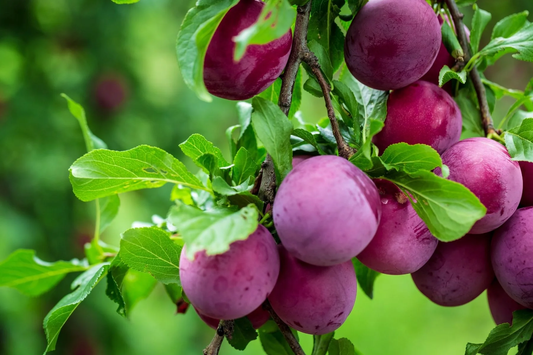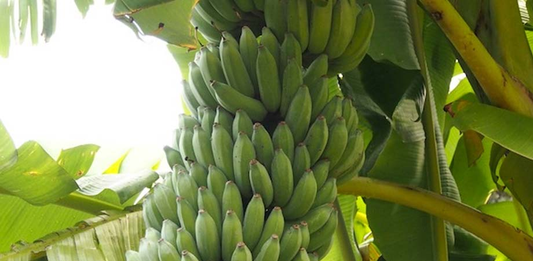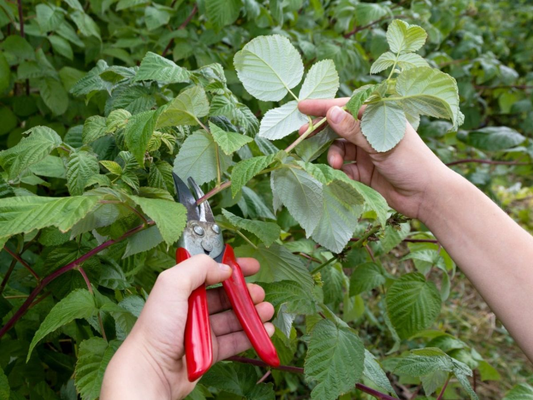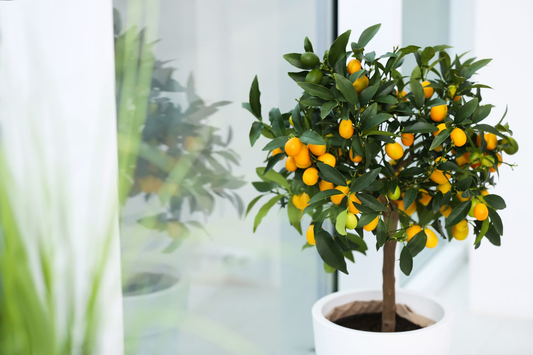5 Reasons to Buy Citrus Tree Seeds and Start Your Own Mini Orchard at Home
Share
Table of Contents
1. Introduction: Why Buy Citrus Tree Seeds?
Imagine walking into your backyard and picking fresh, juicy oranges or lemons right from the tree. Growing citrus trees from seeds has an appeal that goes beyond the novelty of fresh, homegrown fruit; it also provides a rewarding hobby and a way to connect with nature. The process of starting from a tiny seed and eventually nurturing it into a fruit-bearing tree offers a unique sense of accomplishment and satisfaction.
When you choose to buy citrus tree seeds and plant them at home, you gain access to an abundant supply of fresh, flavorful citrus that you can enjoy year-round. Homegrown citrus fruits often taste superior to store-bought ones because they’re picked at the peak of ripeness. Plus, you have control over how the trees are grown, allowing you to use organic methods or avoid harmful chemicals entirely.
Here’s why starting your own citrus orchard from seeds is easier and more beneficial than you might think:
- Easy Access to a Variety of Citrus Types: Buying citrus tree seeds allows you to choose from a wide range of citrus varieties, including lemons, limes, oranges, and grapefruits, giving you a personalized orchard in the making.
- Cost-Effective: Compared to purchasing fully grown citrus trees, seeds are much more affordable, enabling you to experiment with different types without breaking the bank.
- Space-Saving Options: Even if you have limited space, many citrus trees can be grown in containers, making it possible to start a mini orchard on a balcony or patio.
- Eco-Friendly Hobby: Growing citrus trees from seeds reduces reliance on commercial farming, which often involves packaging, pesticides, and long-distance transport.
For anyone with a love of gardening, citrus trees offer a way to create a sustainable, fruitful oasis in your own backyard. Buying seeds is straightforward, and there are many reputable sources available online, making it easier than ever to find quality seeds and get started on this exciting journey.
Below, we explore five compelling reasons why you should consider buying citrus tree seeds and starting your own mini orchard at home, even if you’re new to gardening.

2. Reason #1: Fresh, Homegrown Citrus at Your Fingertips
Imagine the pleasure of stepping into your backyard and picking a fresh lemon, orange, or lime right off the tree. Growing citrus trees from seeds provides the joy of having homegrown citrus fruits available at your fingertips year-round. There’s nothing quite like the aroma and flavor of freshly picked citrus, which enhances any dish, drink, or dessert.
When you buy citrus tree seeds, you open the door to a wide variety of citrus options. Here’s why having your own supply of fresh, homegrown citrus is so rewarding:
- Unlimited Access to Freshness: Freshly picked citrus fruits retain more nutrients and have a richer flavor compared to store-bought options, which often sit in transit for days or weeks.
- Health Benefits: Citrus fruits are packed with vitamins, antioxidants, and immune-boosting properties, making them an excellent addition to your daily diet.
- Cost Savings: By growing your own citrus, you save on grocery costs, especially for organic or specialty citrus varieties.
One of the most exciting parts of starting from seeds is the variety you can cultivate. When you buy citrus tree seeds, you have the freedom to customize your mini orchard with types that match your taste and climate. Whether you love the sweet, juicy bite of oranges or the tangy zest of lemons, there are options for every preference and growing condition.
Popular Citrus Varieties to Grow from Seeds
The following table outlines some popular citrus tree varieties that can be grown from seeds, along with details about flavor, tree size, and climate tolerance:
| Citrus Variety | Flavor Profile | Tree Size | Climate Tolerance |
|---|---|---|---|
| Orange (Valencia) | Sweet and juicy | Medium (up to 15 feet) | Warm climates; needs full sun |
| Lemon (Meyer) | Slightly sweet, less acidic | Small (6–10 feet in containers) | Cold-hardy down to 20°F |
| Lime (Key Lime) | Intensely tart and aromatic | Small (6–8 feet) | Thrives in warm, humid climates |
| Grapefruit (Ruby Red) | Sweet with a hint of bitterness | Large (up to 20 feet) | Best in subtropical to tropical climates |
Whether you have a large yard or a small balcony, there’s a citrus variety that can fit your space. Many types, such as Meyer lemons and Key limes, adapt well to container growth, allowing you to move them indoors during cold months.
3. Reason #2: Cost-Effective Way to Grow a Fruitful Orchard
Starting your own citrus orchard doesn’t have to be an expensive endeavor. One of the main advantages of choosing to buy citrus tree seeds over purchasing mature plants is the significant cost savings. While fully grown citrus trees can be pricey, seeds are an affordable and practical option for anyone looking to enjoy the rewards of homegrown citrus on a budget.
Why Buying Seeds is More Affordable
- Lower Initial Investment: The cost of a packet of citrus tree seeds is typically much lower than buying a single mature tree. For the price of one tree, you can often purchase enough seeds to grow multiple trees, maximizing your investment.
- Economical for Experimentation: Buying seeds allows you to try growing different citrus varieties without a large financial commitment. If you want to explore types like Meyer lemons, Key limes, and Ruby Red grapefruits, seeds offer a budget-friendly way to diversify your orchard.
Long-Term Savings of Growing Citrus at Home
Once your trees start producing fruit, the long-term savings can be substantial. Here’s a breakdown of how cultivating a citrus orchard from seeds compares to regularly buying citrus fruits from the grocery store:
- Reduced Grocery Costs: With mature citrus trees producing an abundance of fruit each season, you can significantly cut down on grocery store expenses for lemons, oranges, limes, and other citrus varieties.
- Organic Savings: Growing your own citrus allows you to avoid the extra costs of organic citrus in stores, as you control the growth process and can opt for organic practices.
- Year-Round Harvest Potential: Some citrus varieties, like lemons, can produce fruit multiple times per year, offering even greater value. With proper care, you’ll have a consistent supply without additional expenses.
Cultivating a Diverse Orchard on a Budget
When you choose to grow citrus from seeds, you aren’t limited to just one or two types due to cost constraints. Instead, seed packets give you the flexibility to explore a variety of citrus species, including:
- Lemons: A versatile and popular choice, lemons are ideal for cooking, cleaning, and health benefits.
- Oranges: Known for their sweet, juicy flavor, oranges are a favorite for snacking and juicing.
- Limes: Perfect for adding zest to dishes, drinks, and desserts.
- Grapefruits: Rich in vitamins, grapefruits bring a tangy, refreshing option to your orchard.

4. Reason #3: Sustainable and Eco-Friendly
Growing your own citrus trees from seeds is not only rewarding but also supports a more sustainable and eco-friendly lifestyle. When you buy citrus tree seeds and grow them at home, you reduce the environmental impact associated with commercially grown fruits, including packaging waste and the carbon footprint of transportation. Here’s how starting a citrus orchard from seeds benefits the environment:
Environmental Benefits of Growing Citrus from Seeds
- Reduced Packaging Waste: Store-bought fruits are often packaged in plastic or other non-biodegradable materials. By growing citrus at home, you eliminate the need for this single-use packaging, helping to reduce plastic waste.
- Minimized Carbon Footprint: Commercial citrus fruits are frequently transported over long distances, contributing to greenhouse gas emissions. Homegrown citrus cuts down on transportation needs, resulting in a smaller carbon footprint.
Creating a Positive Impact on the Local Ecosystem
A homegrown citrus orchard does more than just supply fresh fruit. It can also benefit your local ecosystem:
- Attracting Pollinators: Citrus flowers are known to attract pollinators such as bees and butterflies. By growing citrus trees, you support these essential pollinators, which play a vital role in maintaining biodiversity.
- Promoting Soil Health: Planting trees in your yard or garden encourages soil conservation and helps prevent erosion, enriching the local environment.
Eco-Friendly Tips for Growing Citrus Trees from Seeds
To make your seed-starting process as sustainable as possible, consider these eco-friendly practices:
- Use Biodegradable Pots: Instead of plastic containers, opt for biodegradable pots made from materials like peat, paper, or coconut coir, which can be planted directly into the soil as the tree grows.
- Natural Compost and Fertilizer: Enrich your soil with organic compost and natural fertilizers. Kitchen scraps, composted leaves, and coffee grounds make excellent soil additives, providing nutrients without synthetic chemicals.
- Harvest Rainwater for Irrigation: Use collected rainwater to irrigate your citrus seedlings. This reduces water waste and is especially helpful in regions facing water shortages.
5. Reason #4: Ideal for Limited Space – Grow Citrus in Containers!
One of the great advantages of choosing to buy citrus tree seeds is that citrus trees are highly adaptable and can thrive in containers. This makes them perfect for people with limited outdoor space, such as those living in apartments, urban areas, or homes with small gardens. Whether you have a cozy patio or a sunny balcony, growing citrus trees in containers is a rewarding way to enjoy fresh fruit right at home.
Why Citrus Trees Are Perfect for Containers
- Compact and Manageable: Many citrus varieties are naturally compact, making them ideal candidates for container growing.
- Portable for Optimal Sunlight: Containers allow you to move your citrus trees to different spots to maximize sunlight exposure, ensuring they get the 6-8 hours of direct sunlight they need.
- Protection from Cold: Container-grown trees can be moved indoors or to sheltered areas during cold weather, offering an advantage in regions with harsh winters.
Tips for Successful Container Growing
Growing citrus trees in containers does require some thoughtful preparation to ensure the trees thrive. Here are some tips on container and soil selection, as well as pruning techniques to keep your trees healthy:
-
Selecting the Right Container:
- Size Matters: Start with a container that is at least 12-15 inches in diameter to give the roots space to grow. As the tree matures, you may need to repot it into a larger container.
- Material Choices: Choose a container with good drainage holes. Terracotta, ceramic, and plastic containers are popular options, but ensure they allow for proper drainage.
-
Choosing the Ideal Soil:
- Well-Draining Mix: Citrus trees prefer soil that drains well. Use a high-quality potting mix specifically designed for citrus or cactus plants, as these mixes are formulated for optimal root aeration.
- Avoid Overwatering: Containers can retain moisture, so water only when the top inch of soil feels dry to avoid root rot.
-
Managing Tree Size Through Pruning:
- Regular Pruning: Prune your citrus tree to control its size, especially in containers. Remove dead or overcrowded branches to encourage healthy growth and maintain a manageable height.
- Fertilization Tips: Fertilize your tree with a balanced, slow-release fertilizer designed for citrus plants every few months. This will ensure it gets the nutrients needed for optimal growth in a confined space.
With the right approach to container gardening, growing citrus trees from seeds offers a convenient and enjoyable option for anyone with limited space. Not only will you enjoy the benefits of fresh, homegrown fruit, but you’ll also have the flexibility to move your plants to suit changing sunlight and weather conditions. By following these tips, you can create a thriving citrus orchard on your patio, balcony, or even indoors!

6. Reason #5: A Fun and Rewarding Hobby with Delicious Results
For many, choosing to buy citrus tree seeds is about more than just growing a plant—it’s the beginning of a fun, therapeutic, and rewarding journey. Growing citrus trees from seeds is an engaging hobby that offers not only fresh, flavorful fruits but also a sense of accomplishment and joy that comes with nurturing plants from the very start. Here’s why this hobby is both enjoyable and fulfilling:
The Therapeutic Benefits of Gardening
- Stress Relief: Tending to citrus trees can be calming and meditative, offering a relaxing escape from daily stress.
- Satisfaction of Growth: Watching your tree grow from a tiny seed to a mature, fruit-bearing plant is a deeply satisfying experience.
Gardening as a Family-Friendly Activity
Growing citrus trees can be a fantastic family project, offering an educational and hands-on way to teach children about nature:
- Learning Responsibility: Taking care of a plant teaches kids valuable lessons in responsibility and consistency.
- Connecting with Nature: Growing a citrus tree from seed helps children understand the plant lifecycle and appreciate the natural world.
- Building Memories: Gardening as a family creates lasting memories, from planting seeds to harvesting fresh fruit together.
The Unique Flavors of Homegrown Citrus
- Unmatched Freshness: Homegrown citrus fruits are picked at their peak ripeness, providing flavors that are far superior to store-bought options.
- Variety of Tastes: Growing your own citrus allows you to explore diverse types, from sweet oranges to tangy lemons, tailored to your taste preferences.
A Sense of Accomplishment
Nurturing a tree from a seed requires patience and dedication, but the result is highly rewarding. Each step in the growth process—from seedling to fruit-bearing tree—reinforces a sense of achievement. Growing citrus trees from seeds becomes more than just gardening; it’s a fulfilling hobby that brings lasting enjoyment and a delicious bounty.
Embrace the journey of cultivating your citrus trees from seeds, and enjoy the unique rewards of this fulfilling hobby. With each season, you’ll not only have fresh fruits at hand but also a deeper appreciation for the beauty of growing your own food.

7. How to Buy Citrus Tree Seeds and Get Started
If you’re ready to buy citrus tree seeds and embark on the journey of growing your own citrus trees, it’s essential to start with high-quality seeds and proper preparation. Below is a step-by-step guide to help you find reputable suppliers, choose the right varieties, and prepare the seeds for successful germination.
Step 1: Researching Reputable Seed Suppliers
To ensure a good start, sourcing your seeds from a trustworthy supplier is key. Here are tips for finding a reliable seller:
- Look for Organic or Heirloom Options: Organic or heirloom citrus seeds are often more viable and provide healthier plants.
- Read Customer Reviews: Checking reviews on the supplier’s website or online platforms can give you insights into seed quality and germination success rates.
- Verify the Seller’s Certifications: Reputable seed suppliers often hold certifications or memberships with plant health organizations, ensuring quality standards are met.
Step 2: Selecting Varieties Based on Climate and Taste Preferences
Choosing the right citrus variety is crucial, especially if you’re growing your trees in a specific climate. Here’s how to make the best selection:
-
Climate Suitability: Consider varieties that thrive in your local climate. For example:
- Lemons and Limes: Generally more cold-tolerant, making them suitable for various regions.
- Oranges and Grapefruits: Prefer warmer climates and are great for regions with mild winters.
-
Flavor Preferences: Different citrus fruits have unique flavors. Choose according to your taste preference:
- Sweet and Juicy: Oranges and mandarins provide a sweet, juicy taste.
- Tart and Tangy: Lemons and limes offer a refreshing, tangy flavor.
Step 3: Preparing Seeds for Germination
Once you buy citrus tree seeds and have chosen the varieties, prepare the seeds for optimal germination. This process ensures your seeds are ready for planting:
-
Soaking the Seeds:
- Soak citrus seeds in lukewarm water for 24 hours to soften the outer shell, which can help speed up germination.
- This step is especially helpful for older seeds that might need extra hydration.
-
Scarification (Optional):
- If seeds have a particularly hard outer shell, gently nick the surface with a nail file. This helps water penetrate and promotes faster sprouting.
- Use caution with scarification, as too much can damage the seed.
Checking Seed Quality and Viability
When buying citrus tree seeds, it’s important to assess their quality and viability. Here are tips for checking seed quality:
- Inspect Seed Appearance: Healthy seeds should be plump and have a smooth, intact shell.
- Conduct a Float Test: Place seeds in water. Viable seeds usually sink, while unviable ones float.
- Buy Fresh Seeds: Fresher seeds have a higher germination rate, so aim to purchase from suppliers who indicate the harvest date.

8. Tips for Growing Healthy Citrus Trees from Seeds
Growing citrus trees from seeds is a rewarding experience, but it requires attention to detail to ensure healthy germination and growth. Here are essential tips for cultivating robust citrus seedlings from the start:
Choosing the Right Soil Mix
- Well-Draining Soil: Citrus trees thrive in well-draining soil, so opt for a potting mix that includes components like sand, perlite, or vermiculite.
- Slightly Acidic pH: Aim for a soil pH of 6.0-7.0, as citrus plants prefer a mildly acidic to neutral environment.
- Fertilization: Use a slow-release fertilizer specifically for citrus trees to provide essential nutrients as seedlings develop.
Providing Adequate Sunlight and Water
- Sunlight: Citrus seedlings need 6-8 hours of bright sunlight daily. Position them near a sunny window or consider using grow lights if natural light is limited.
- Watering: Keep the soil evenly moist but not waterlogged. Avoid overwatering, as citrus roots are prone to rot in soggy soil.
- Humidity: Citrus plants benefit from moderate humidity. Mist plants occasionally or use a humidity tray to maintain moisture around the seedlings.
Managing Pests and Diseases
Citrus seedlings are susceptible to common pests and diseases. Here are some ways to protect young plants:
- Aphids and Spider Mites: Check seedlings regularly and remove pests manually. Use insecticidal soap if needed.
- Root Rot Prevention: Ensure proper drainage and avoid overwatering to prevent fungal root diseases.
- Leaf Spot: Treat early signs of leaf spots by removing affected leaves and using natural fungicides if necessary.
Transplanting Young Citrus Trees
As your citrus seedlings grow, they’ll eventually need more space. Here’s how to safely transplant them:
- Wait for Adequate Root Development: When roots begin to fill the starter container, it’s time to transplant.
- Choose a Slightly Larger Pot: Move seedlings into a container about 2-3 inches larger in diameter to allow for root expansion without overwhelming the plant.
- Handle Gently: Carefully lift the seedling by the base, being mindful not to damage delicate roots.
Patience and Expectations
Growing citrus trees from seeds is a slow but rewarding process. Keep in mind that seed-grown trees may take several years to bear fruit. With patience and attentive care, your young trees will thrive and reward you with fresh citrus in time.
9. Pros and Cons of Growing Citrus Trees from Seeds
Growing citrus trees from seeds offers many advantages, but it's important to consider the potential challenges as well. Below is a comparison of the pros and cons to help you make an informed decision:
| Pros | Cons |
|---|---|
| Cost-Effective: Seeds are significantly cheaper than purchasing mature trees, making them an affordable option for home gardeners. | Longer Time to Fruit: Seed-grown citrus trees take longer to bear fruit compared to grafted trees, sometimes up to 5-10 years. |
| Variety Selection: Buying citrus tree seeds allows you to choose from a wide range of varieties, some of which may not be available as mature plants. | Potential Variability in Fruit Quality: Trees grown from seeds may not produce fruit with the same characteristics as the parent tree, leading to possible variation in taste and size. |
| Eco-Friendly: Growing from seeds reduces the need for plastic containers and long-distance transportation, making it a more sustainable option. | Requires Optimal Care and Patience: Seedlings need consistent care and attention. You’ll need to monitor watering, light, and pest control regularly. |
| Rewarding: Growing citrus trees from seeds is a gratifying process that allows you to nurture plants from their earliest stages and watch them thrive. | Risk of Failure: Germination and early growth stages can be unpredictable, and some seeds may not sprout or thrive. |
10. Frequently Asked Questions (FAQ)
Here are answers to some common questions about growing citrus trees from seeds:
-
Q1: How long does it take for a citrus tree to bear fruit from seeds?
It typically takes 5 to 10 years for a citrus tree grown from seeds to bear fruit. The timeline can vary depending on the variety, growing conditions, and care given to the tree.
-
Q2: Can I grow any type of citrus tree from seeds?
Most citrus varieties can be grown from seeds, including lemons, limes, oranges, and grapefruits. However, some varieties may be more challenging or slower to grow from seed than others.
-
Q3: Do citrus trees grown from seeds produce the same quality of fruit?
Citrus trees grown from seeds can sometimes produce fruit that differs in quality from the parent tree. The fruit may vary in size, flavor, and other characteristics due to genetic variation, especially if cross-pollination occurs.
-
Q4: What are the best conditions for growing citrus trees indoors?
Citrus trees grown indoors need plenty of sunlight—at least 6-8 hours per day. Keep the tree in a warm location with temperatures between 65-75°F (18-24°C). Make sure the tree is in well-draining soil and water it regularly without overwatering.
-
Q5: Are there any challenges with pests or diseases when growing citrus from seeds?
Yes, pests like aphids, spider mites, and scale insects can affect citrus trees, even when grown from seeds. It's important to monitor for signs of pest infestation and use natural remedies, like insecticidal soap, to manage them. Additionally, citrus trees may be prone to fungal diseases, particularly if overwatered or grown in humid conditions.
Additional Resources
How to Start a Herb Garden in Containers – Perfect for City Dwellers a – XRoci
10 Stress-Free Best Plants for Low Maintenance Indoor Gardens – XRoci
Discover the Joy of Indoor Strawberry Farming: How to Grow Strawberrie – XRoci
Top 10 Reasons You Should Buy Organic Herb Seeds for Your Kitchen Gard – XRoci




